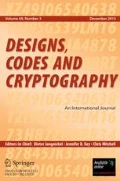Abstract
We present generalized MacWilliams identities for binary codes. These identities naturally lead to the concepts of the local weight distribution of a binary code with respect to a word u and its MacWilliams u-transform. In the case that u is the all-one word, these ones correspond to the weight distribution of a binary code and its MacWilliams transform, respectively. We identify a word v with its support, and consider v as a subset of {1, 2,..., n}. For two words u,w of length n such that their intersection is the empty set, define the u-face centered at w to be the set \({\{z \cup w : z \subseteq u\}}\) . A connection between our MacWilliams u-transform and the weight distribution of a binary code in the u-face centered at the zero word is presented. As their applications, we also investigate the properties of a perfect binary code. For a perfect binary code C, the main results are as follows: first, it is proved that our local weight distribution of C is uniquely determined by the number of codewords of C in the orthogonal u-face centered at the zero word. Next, we give a direct proof for the known result, concerning the weight distribution of a coset of C in the u-face centered at the zero word, by A. Y. Vasil’eva without using induction. Finally, it is proved that the weight distribution of C in the orthogonal u-face centered at w is uniquely determined by the codewords of C in the u-face centered at the zero word.
Similar content being viewed by others
References
Britz T.: MacWilliams identities and matroid polynomials. Electron. J. Combin. 9(1) (2002), Research Paper 19, 16 pp. (electronic).
Etzion T., Vardy A.: Perfect binary codes: constructions, properties, and enumeration. IEEE Trans. Inform. Theory 40(3), 754–763 (1994)
Heden O.: On the reconstruction of perfect codes. Discrete Math. 256(1–2), 479–485 (2002)
Heden O.: On the faces problem for perfect codes. In: Proceedings of the Thirty-Fourth Southeastern International Conference on Combinatorics, Graph Theory and Computing. Congr. Numer. 162, 161–171 (2003)
Janusz G.J.: Overlap and covering polynomials with applications to designs and self-dual codes. SIAM J. Discrete Math. 13(2), 154–178 (2000)
MacWilliams F.J., Sloane N.J.: The Theory of Error-Correcting Codes. North-Holland, Amsterdam (1998)
Vasil’eva A.Y.: Local spectra of perfect binary codes. Russian translations. II. Discrete Appl. Math. 135(1–3), 301–307 (2004)
Author information
Authors and Affiliations
Corresponding author
Additional information
Communicated by G. McGuire.
Rights and permissions
About this article
Cite this article
Hyun, J.Y. Generalized MacWilliams identities and their applications to perfect binary codes. Des. Codes Cryptogr. 50, 173–185 (2009). https://doi.org/10.1007/s10623-008-9222-6
Received:
Revised:
Accepted:
Published:
Issue Date:
DOI: https://doi.org/10.1007/s10623-008-9222-6


